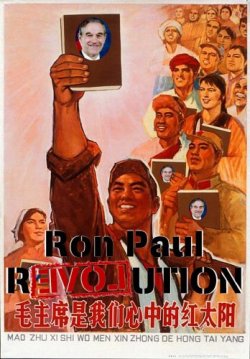We put the “Arch” in “Anarchy” #2
 David Gordon — a Rothbardian anarchist and frequent contributor to
David Gordon — a Rothbardian anarchist and frequent contributor to anti-state, anti-war, pro-market
LewRockwell.com — wrote an Open Letter To Libertarians on Ron Paul in which he denounces the running-dog radical libertarians who oppose Chairman Ron’s Great Libertarian Electoral Revolution. Here’s what he has to say about opposition to Chairman Ron’s position on abortion:
No power to regulate abortion is granted to the federal government. Some of course claim that the Fourteenth Amendment changes matters, but it requires very strained interpretation to conjure a right to abortion out of the text of this Amendment. One critic of Ron Paul has admitted that Roe v. Wade is bad law but thinks we should somehow get to the
correctpro-abortion view. Is this not to surrender the possibility of constitutional limits on the federal government?
Yes. So what?
Anarchists don’t believe in constitutional government.
On Ron Paul’s support for an even more aggressive police state to enforce international apartheid:
Some object to Ron Paul because he does not support an
open bordersimmigration policy. But why should one take this position to be essential to libertarianism? Hans Hoppe has raised strong objections to open borders; and Murray Rothbard, in his last years, abandoned the view. Free immigration combined with a welfare state is a dangerous brew: does it make sense to reject Ron Paul because he cannot accept it?
Yes.
Anarchists don’t believe in national borders and they don’t believe in a federal police state to enforce them.
It may be true that when you combine something fundamentally moral — free immigration — with something completely immoral — a coercive welfare state funded by expropriated tax funds — you’ll get bad consequences from the combination. But that’s a good reason to try to limit or eliminate the immoral part of the combination, by undermining or dismantling the apparatus of taxation and government welfare. It’s certainly not a good reason to try to limit or eliminate the moral part of the combination by escalating the federal government’s surveillance, recording, searching, beating, jailing, and exiling innocent people. Anarchists have no reason to accept the latter, either as a policy position, or even as a matter about which reasonable libertarians can agree to disagree.
Oddly, some of the same people who condemn Ron Paul for apostasy are themselves so devoted to
left libertarianismthat they subordinate libertarian principles to certain cultural values. They favor gender equality and are concerned lest we think ill of certain preferred minority groups. Libertarianism, they think, will best promote these values, and this fact is for them a chief reason to support libertarianism.
Since Gordon refuses to identify any individuals whose specific positions he is criticizing, it’s hard to tell whether he’s referring to the essay on libertarian feminism that Roderick Long and I co-authored, or whether he means to refer to somebody else. (If so, whom?) So it’s hard to know whom he expects to answer him when he asks:
Does not the question then arise, should libertarianism be subordinated to these values?
If he does intend to refer to my position, then he’s made two serious mistakes.
First, I don’t think that libertarianism should be subordinated to certain cultural values
such as radical feminism. I believe that libertarianism, rightly understood, is both compatible with and mutually reinforcing with the cultural values of radical feminism, rightly understood. (For a more detailed explanation of the different kinds of links that there may be between libertarianism and radical feminism, see my reply to Jan Narveson on thick
libertarianism.) The independent merit of radical feminism is one reason to support libertarianism as a political project (because opposing the patriarchal State is of value on feminist grounds), but that’s never been the sole reason or the primary reason I have suggested for being a libertarian. The primary reason to be a libertarian is that the libertarian theory of individual rights is true. From the standpoint of justice, the benefits that a stateless society offers for radical feminism are gravy. If there were some kind of proposal on the table to advance radical feminist goals by statist means, then I would reject the proposal, in favor of proposals that advance radical feminist goals by anti-statist means.
Second, libertarianism
is not conceptually equivalent to actively supporting the most libertarian candidate in a government election.
Libertarianism is a theory of political justice, not a particular political party or candidate. If one invokes feminist, anti-racist, or any other reasons not to actively support Ron Paul’s candidacy, those reasons may be good reasons or they may be bad reasons. But they are reasons for subordinating one particular strategy for libertarian outreach and activism — a strategy which, by the way, has basically zero empirical evidence whatever in favor of its effectiveness — to other concerns. But so what? There’s no reason for libertarians, and especially not for anarchists, to treat government elections as the be-all and end-all of libertarian principle.


